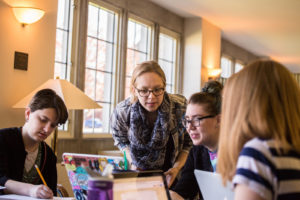The Pre-Teaching Jitters
One of the most provocative chapters in Maggie Berg and Barbara K. Seeber’s The Slow Professor: Challenging the Culture of Speed in the Academy advocates for a pedagogy of pleasure – for approaching teaching with joy. It’s a chapter that made me sit down hard and pay attention. I absolutely agree with the premise that one of the conditions of teaching well is to enjoy what you’re doing, but the suggestion that we should feel joy around teaching has proven hard for me to fathom.
Reading the book forced me to greet the elephant in the room: I still get nervous before class. I experience great joy while in the middle of teaching, but always view the beginning of class with trepidation. Imposter syndrome pops up. I worry that someone will ask a question I can’t answer (as if saying “I don’t know, but I’ll find out” would be beyond me). I think of the energy I’m about to invest and shrink from it. This will tap me out, I think.

And yet these things are not true once I begin to teach. I love the flow of the classroom, of the back and forth between myself and students, the energy that’s shared. I derive utter delight from their thoughts and ideas, and our frequent laughter. I love watching them discover new things and alter their understanding of the world because of it. It’s absolutely my jam.
So how to work with the dissonance?
Yesterday, in conversation with colleagues about these issues, a professor from the biology department talked about the physiology of preparing to perform – that the body dumps sugar and hormones into our system so that we can deftly lead. This was a revelation to me. Talk about a new narrative about the agitation I feel before I teach – it was mind-blowing to consider that I was not somehow faulty for feeling my whole being vibrate with energy, but simply misidentifying it.
The same colleague also suggested that part of the problem was that we put unreasonable pressure on ourselves with regard to research – that somehow we have grown to believe that our research questions must be answered immediately, and that every moment spent not research was an opportunity lost. Instead, she suggested, we should accept that the questions we had would be questions in five years and ten, and an hour of missed work one afternoon would not kill us or our agenda. The whole group spent time admitting that our best ideas tend to come to us not when we’re sitting at the computer but when we’re in the shower and have the spaciousness to receive new thoughts. A little breathing room, suggested my colleague, could not only transform our scholarly lives but our teaching ones too. If we tried to fit just a little less into our week, what might occur?
I can extend this to so many things in my professional life. While teaching is the primary focus of my job at a small liberal arts school, many other things get between it and me. The guilt I feel about research is one thing, but there are also my administrative duties, my service obligations, the program I co-direct, the books I need to read, the letters of recommendation I write. Sitting down and finding unbroken time to prepare for class has become a vanishing luxury, a thing to squeeze in between meetings, rather than a protected priority in my day. What if I reverse that? What if I protect teaching time as extended time – prepping, teaching, grading too – and work everything else around it? How might that lessen my tension before I teach?
Other colleagues suggested wonderful ways to mitigate the pre-teaching jitters. One suggested that what’s worked for her is ritual – getting to the classroom early, checking the computer, writing an agenda on the board. I love the idea that ritual is involved, and the idea made me think of Mary Rose O’Reilley’s suggestion that we practice hospitality in the classroom – creating space to greet people by name as they arrive (and for those for whom greeting students is too hard, to instead substitute a gentle leave-taking). I need rituals to put place for myself that slow me down, make me more mindful, less likely to rush headlong into teaching without catching my breath before I begin. I love ritual throughout my life – lighting candles of an evening when my work is done; baking cookies with a friend every holiday season; reading before bed – so the idea of a pre-teaching ritual resonates with something that already brings me joy.
So my goal for next term is to seek the pleasure that Berg and Seeber describe, to provide myself with the spaciousness I need to sink into the teaching groove before I get to the classroom. I have Google calendar open as I type, ready to block off time to teach thoughtfully and well, and Mary Rose O’Reilley’s book Radical Presence: Teaching as Contemplative Practice at my elbow. Break is the perfect time to try and see this situation from a different perspective. May the new year bring us all joy.